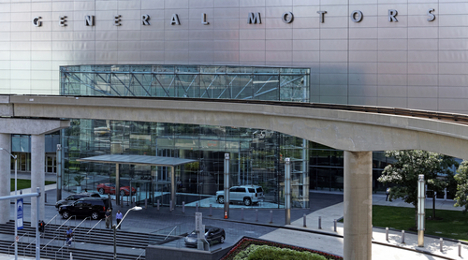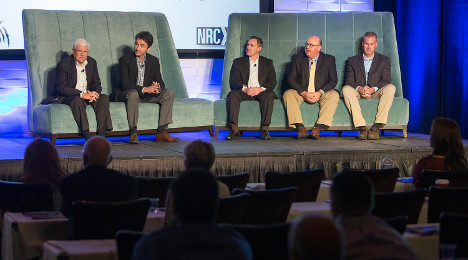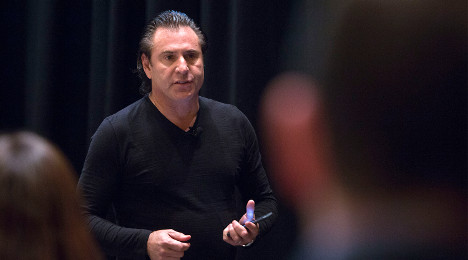As online bidding evidently intensified, Black Book also noticed the price strength of cars continued last week.
The latest Black Book Market Insights report showed that overall car values, when looking at volume-weighted data, appreciated slightly by 0.09 percent last week as opposed to the average weekly depreciation rate of 0.19 percent seen during the previous four weeks.
Among car segments, editors noticed the sporty car and sub-compact car segments performed the best, increasing by 0.50 percent and 0.36 percent, respectively.
Again based on volume-weighted data, Black Book reported that overall truck values were nearly flat last week. The average weekly depreciation rate for trucks had been 0.31 percent during the previous four weeks.
Within those truck segments, editors determined compact vans improved the most in value by 0.59 percent whereas compact luxury crossover/SUVs dropped the most in value by 0.20 percent.
“Market strength continued last week with most car segments showing an appreciation in values, led by sub-compact and sporty cars,” said Anil Goyal, senior vice president of automotive valuation and analytics at Black Book.
In terms of how dealers are acquiring inventory, a pair of Black Book sale attendees described how store managers leveraged online capabilities instead of just watching the lanes in person.
A Black Book representative in Illinois reported back, saying, “Smaller crowd in the lanes, but online bidding was brisk. Very few no-sales and prices were consistently strong.”
A similar scenario unfolded in Ohio as the lane watcher noted, “A lot of the bidding at this high-line sale was online. Increased interest in cars over trucks and SUVs had a lot to do with price.”
Moving further to the East, the report out of Massachusetts went this way: “A rep from a large dealer group stated the market was ‘on fire’ today. SUVs and trucks were the strongest.”
In the Sunshine State, Black Book discovered consignors enjoyed success at the Florida auction where Black Book stationed a representative who said, “OEM and bank-owned vehicles sold at high percentages but were almost all nice vehicles with acceptable miles considering the model years.”
And finally turning attention out West, Black Book’s auction attendee in Washington mentioned that the “auction owner reported on a sale where the sold percentage was 73 percent. This was an event sale but that percentage certainly supports a strong market.”
Black Book’s specialty report for April
As it does on a monthly basis, Black Book also examined the specialty segments for its latest Market Insights report. The rundown is as follows:
—Collectibles: Editors noted this year started off on a high note with the collectible car auctions in Florida and Arizona pulling in big numbers, and the five auctions held in conjunction with the Amelia Island Concours d’Elegance kept the momentum going with $121 million in sales.
—Recreational vehicles: With the exception of a few pockets of the country where the winter refuses to relax its grip, Black Book said it has started to see nicer weather and an active spring market.
—Powersports: Editors described the powersports market “is roaring ahead ‘full throttle’ this month with some of the largest increases in value they’ve seen in “quite some time.”
—Heavy duty: Black Book touched on this segment by stating, “The spring season brings us warmer weather, a fresh start for the New Year and used truck buyers refreshing their equipment if they are an end user, and restocking their inventory if they are a dealer.”
—Medium duty: Overall, editors pointed out medium duty trucks showed signs of strength in March, “which has been the norm for the past few years.”
DealerRater, announced on Friday that it has a new partnership with CU Direct, which allows the credit union technology and automotive solutions provider to publish DealerRater reviews and ratings on its vehicle shopping and research platform, AutoSMART.
The platform enables auto dealers to sell more cars faster and easier and it exposes dealers to a unique marketing channel to push their inventory, according to DealerRater.
Dealers also have access to new growth opportunities and strengthen their brand among credit unions.
"DealerRater continues to actively and aggressively extend the reach of our review content across multiple platforms through strategic syndication agreements," Jamie Oldershaw, general manager of DealerRater, said in a news release. "AutoSMART is the perfect platform for DealerRater reviews and ratings because it allows dealers to leverage invaluable consumer word of mouth to put a spotlight on their dealerships and attract more customers."
AutoSMART currently has 1,100 credit unions signed on that represent 42 million potential car buyers, according to DealerRater.
"AutoSMART provides dealers with a state-of-the-art platform to better connect with credit unions, finalize more deals faster and generate more revenue," CU Direct vice president of automotive products Evan Etheridge said. "By further enhancing the platform with DealerRater's trusted reviews and ratings, we're providing, even more, value to our dealers, credit unions and to car buying members and consumers."
The platform’s features include a dynamic user interface, dedicated Dealer Pages, and the ability to push inventory with special offers.
DealerRater reviews will appear on AutoSMART starting this month. Additionally, dealers can also request that reviews and ratings display on their profile page.
Various areas around the world, including college campuses, cities, residential areas, and peer-to-peer platforms have already or are in the works to be affected by General Motors’ vehicle-sharing initiatives. On Thursday, these initiatives united under one new GM brand: Maven.
According to GM, Maven’s mission is to give customers access to highly personalized, on-demand mobility services. Globally, the Maven team has over 40 employees with experience in the connected-car technology industry as well as ride- and car-sharing experts from Google, Zipcar and Sidecar.
“GM is at the forefront of redefining the future of personal mobility,” said Dan Ammann, GM’s president. “With the launch of our car-sharing service through Maven, the strategic alliance with ride-sharing company Lyft, and building on our decades of leadership in vehicle connectivity through OnStar, we are uniquely positioned to provide the high level of personalized mobility services our customers expect today and in the future.”
Here’s a breakdown of Maven’s expanded global offerings, as listed by GM in its news release:
City: Maven is announcing that it is offering its car-sharing program to more than 100,000 people in Ann Arbor, Mich., initially focusing on serving faculty and students at the University of Michigan.GM vehicles will be available initially at 21 parking spots across the city.
- Additional city-based programs will launch in major U.S. metropolitan areas later this year.
- Maven customers will experience seamless smartphone and keyless integration with the vehicle. Maven customers use its app to search for and reserve a vehicle by location or car type and unlock the vehicle with their smartphone. The app also enables remote functions such as starting, heating or cooling and more. Customers can bring their digital lives into the vehicle through Apple CarPlay, Android Auto, OnStar, SiriusXM radio and 4GLTE wireless. Each vehicle will provide an ownership-like experience with the convenience of car-sharing.
- Maven pricing is simple and transparent and includes insurance and fuel.
- As Maven grows, the team will use innovative ways of connecting personally with customers. Ann Arbor Maven users will have direct access to Maven leadership and core team members via the messaging application WhatsApp to share their experiences, ideas and thoughts with the team as they help shape the Maven service.
Residential: In the first quarter of 2016, Maven will launch car-sharing services for Chicago residents in partnership with Magellan Development Group. Maven is also expanding its existing residential program in New York City (previously called Let’s Drive NYC) with Stonehenge Partners giving users on-demand access to vehicles and preferred parking options. Both programs combined will offer service to more than 5,000 residents.
Peer-to-Peer: Existing global initiatives include peer-to-peer car-sharing through the CarUnity market place in Germany. Nearly 10,000 users have signed up in Frankfurt and Berlin since mid-2015.
Campus: Various programs are running on GM campuses in the U.S., Germany and China to refine and test future Maven commercial offerings.
Karl Brauer, senior analyst at Kelley Blue Book, compared today’s automotive business environment to the early days of commercial Internet.
“The personal transportation industry in 2016 is feeling a lot like the Internet world of 1999,” Brauer said. “There's a massive collision occurring between start-ups and established brands, all of them jockeying for position in an uncertain world. The Maven launch will give GM broader reach in this dynamic atmosphere, but nobody knows which of these alternative transportation systems holds the greatest long-term potential. This is why we're seeing a shotgun approach coming from multiple automakers.”
Another KBB analyst, Jack Nerad, also the company’s executive editorial director, believes this is not only a learning experience but also a solid marketing opportunity for GM.
“While there is some debate over how important ride-sharing services will be in the future, there is no doubt that the top global car companies want to have exposure in the space and gain learnings from early adopters. A pilot program like GM’s Maven can not only provide those learnings but can also be a marketing opportunity, exposing GM vehicles to groups that might not otherwise consider them.”
The International Automotive Remarketers Alliance has issued an open letter to the industry designed to “advocate for the establishment of a cross bidding multi-platform online remarketing solution,” a position the alliance says 20 of 23 responding IARA consignors supported in a recent survey of its U.S. consignor members.
The IARA lists 13 consignor member it says have added their names to the letter as supporters of the initiative.
The alliance noted that seven additional ones “expressed their strong support for the cross bidding multi-platform system but could not add their name to this letter due to internal company policy.”
IARA indicates that three of its consignor members “responded saying they did not actively support this initiative.”
Eleven surveyed members did not respond.
The letter, which was authored by the IARA Standards Committee, states: “Led by our consignor members and our Standards Committee we remain devoted to the creation of a central interface that allows consignors to offer vehicles on various online sites at the same time with continuous bidding across all venues.
“This not only creates efficiency for the consignor, but allows buyers to source a larger selection of vehicles in one consolidated location. Web-based purchasing has become increasingly popular in the remarketing space, and the committee believes that a cross bidding multi-platform site is a certain, and necessary, remarketing solutions tool for consignors and buyers across the nation,” it continues.
“Consignors have the need for a centralized interface to facilitate online sales activities across their chosen auction platforms. This increases efficiency for consignors when selling their inventory, while also helping drive standardization among condition reporting language, vehicle grading systems, photography standards and auction times,” the letter adds. “In addition to market consistency, the central interface will create a competitive bidding environment and improve sales results by ensuring that a vehicle is being exposed to the highest number of buyers possible — more eyes on more cars.”
The entire letter can be read here.
When the cross-bidding capability within the multiplatform wholesale environment comes to fruition, said ARI’s Bob Graham, it will mark the most significant innovation since the Internet in terms of impact to the remarketing industry.
“Cross-bidding among platforms will exponentially increase the opportunity for a seller to sell their vehicle faster and for a higher sales price because of competition,” Graham, vice president of vehicle remarketing at ARI, told Auto Remarketing. “In my mind, when it happens, and I’m sure it will at some point, it will be the biggest advancement to remarketing since the Internet itself.”
Cross-bidding, he says, is the key development to remember when discussing multiplatform in the remarketing business. What often gets lost is that the multiplatform piece of the puzzle has been around for nearly a decade; the new wrinkle to the discussion now is the cross-bidding capability that has been developed.
“I’m fully on board with multiplatform, and really cross-bidding, which is the key element of it all. One of the things I would say is that in all the press releases and stories, the headline is always multiplatform. To me, the headline isn’t really multiplatform, it should be cross-bidding,” Graham explained.
“Multiplatform is the ability to take your vehicles and put them on multiple platforms, ADESA.com, Manheim’s OVE, etc., and various other websites, all at the same time. Multiplatform itself has existed for a long time,” he continued.
“We at ARI have had multiplatform for almost 10 years,” Graham added. “Within the last two to three years, two independent technology companies, Liquid Motors and AiM, developed the same style of multiplatform and have offered it as a service or product to remarketers. And there are a number of companies who have taken them up on that product. As an industry, multiplatform already exists.”
From a seller’s perspective, multiplatform allows them to get more eyeballs on their cars by having the vehicles listed on several websites instead of just one, Graham said. However, what it doesn’t currently allow for is cross-bidding throughout those platforms.
That’s what the development around MPS, also referred to as the Hub, is all about, he noted.
“Now, if a buyer is on OVE and another buyer is on ADESA.com, they can’t bid against each other, because the platforms are in silos,” Graham said. “What happens today with multiplatform is that it’s really an exposure mechanism to get your vehicles on all the platforms.
“And what the seller does is they start the bidding at their floor price. As soon as someone bids on any one of those various websites, the seller knows they have at least an acceptable bid, and the technology pulls the vehicles down from all the websites, except for the one that got that first bid that matched the seller’s floor price,” he continued. “Bidding will continue in that one silo, let’s say OVE, for a couple more hours or days, so you don’t know yet what the final price is or who the final buyer is, but you know your floor price has been met or exceeded and now you are selling it in that one silo.
“So that’s what multiplatform is today. The new piece, and the important piece, is cross-bidding. It’s the auction’s initiative to tie their systems together so that buyers on OVE and ADESA.com — I will use those two examples for simplicity — could bid against each other in real time.”
Much of what Graham expressed was reflected in an explanation by Manheim North America president Janet Barnard to help clear up one “point of confusion” she often sees.
Barnard said that “the difference between what exists today and what we’re piloting is — this is my term — dynamic bidding.”
As multiplatform currently exists, once the bid hits the reserve price, the platform receiving that particular bid “continues the facilitation from that point on,” she said.
“And the bidding stops in the multiplatform environment. In this Hub arrangement, that competitive bidding continues until the car is sold. So, even after the bid reaches the reserve price, the competitive bidding continues throughout the entire marketplace among all the participants in MPS,” Barnard said.
“And that’s the key for the customer. That’s the push that we continue to hear from our customers. They want that specific piece to be the next enhancement in MPS,” she added. “The multi-listing service already exists. So this effort is not a replication of what exists today.”
The multiplatform system initiative is not only the hottest topic in the remarketing industry right now, but it’s also perhaps the most complex, with an onion’s worth of layers involving handfuls of providers, players, participants and perspectives.
Auto Remarketing has been following this story closely and sought out several directly involved and others willing to share their perspective on MPS for their insight on the matter.
‘We Will Continue’
“One message we want to leave with you, clearly, is that this is not dead,” Manheim North America president Janet Barnard told Auto Remarketing near the start of a March 4 interview.
“And because our customers are pushing all of us to make progress here, we will continue,” she continued. “We’ve known all along that it would be difficult to get everyone to agree, and as long as there are more than one of us talking and making progress, then we’ll continue to do that.”
Barnard, as one may expect, was referring to the multiplatform system initiative (MPS) in a follow-up interview with Auto Remarketing, after news in late February that ADESA and ServNet were withdrawing from the currently proposed project. Manheim is remaining part of the MPS project.
Barnard was speaking to Auto Remarketing prior to the antitrust filing with the Department of Justice that was announced Thursday by Manheim, which was joined in the DOJ filing by fellow industry participants WTG Global (Whann Technology Group), BSC America Inc. and Columbus Fair Auto Auction.
Barnard had said in the March 4 interview that one of the next moves in the MPS project was the DOJ filing.
When it comes to the antitrust concerns that have been raised regarding MPS, she said in that interview, “we absolutely have none of those and will continue to do all that the coalition has been doing to ensure that this is very pro-competitive and open to all. And the filing is the next step in that.”
Barnard continued: “The other thing that we’re doing from a practical standpoint — and I won’t get into specifics with it — but we are continuing to pilot live transactions, in a pilot mode with other industry partners, and we’re getting ready to do that, on the heels of testing this out in the fourth quarter of 2014, where we actually were able to move transactions through the Hub among some of the industry people that were working on this.
“So, that broader pilot with more live transactions is going to be undertaken very soon. So from our viewpoint, nothing has changed,” Barnard continued, adding that the “progression and the building and the conversations that has taken place in the past is going to continue.
“Apparently, it will be comprised of a different group than we were dealing with, but that’s OK, too. As long as there’s forward progress, we’re happy to be working with some industry partners to provide what our customers are asking for," she said.
Later offering some additional context to that pilot testing, Barnard added: “We have the capability to move the transactions. We have a commitment from two significant customers that have consented to participate with us and another industry partner to move those transactions. I can’t name them today, but we’ll putting out a more comprehensive announcement about that very soon.
“But there are not only auction partners that have agreed to participate in the pilot, but also customers (sellers) that have agreed to participate in the pilot. So, this is the next step in making it come to life.”
More Context on Legal Issues
In a Feb. 23 statement, ADESA said it “believes the proposed MPS structure and its associated economic and governance model poses antitrust risks by raising new barriers to entry for smaller industry players, reducing competition among the auctions and increasing costs for sellers, buyers and ultimately retail consumers.”
Keith Whann — founder of Whann Technology Group, which put out its own statement on the overall MPS matter in late February and later talked with Auto Remarketing on March 5 — also shared some thoughts regarding the legal issues.
Although he does not actively practice law anymore, Whann has 29 years of auto and legal experience, which he began as an assistant Ohio attorney general and the founder of the law firm Whann & Associates. Today, in addition to his technology group, Whann is also the co-owner and chief executive officer of the Columbus Fair Auto Auction as well as holding the same titles at Group 3 Auctions and its subsidiary, AWG Remarketing.
“When you say the legal issues, you can go really a couple of different directions. The one people are talking about is some sort of potential antitrust issue. And I really don’t see that being the case, given the fact that you’ve got others with marketplaces who have chosen not to participate, and you have a situation here where there’s a couple of big companies. And obviously, we (Whann Tech) are not a very large company, we don’t have all the resources in the world, and we’ve been able to construct something,” Whann said, referring to his company’s specific product.
“Typically, when you start to talk about antitrust, you’re looking at barriers of entry into the marketplace and one being able to use their size or influence over some of the others to their disadvantage,” Whann said. “I don’t know that that exists here. But by the same token, any time you have people doing things together in concert like this that makes up a large part of the market, I think it’s advisable to be able to go to the regulator and ask a question and let them opine on that.
“With respect to other types of legal issues that you look at, this is vastly different than the retail world, so you’re not dealing with all of the typical laws, rules and regulations you would with the retail sales of motor vehicles. On the wholesale level you have business-to-business transactions. For the most part, contract law is going to govern the relationship, in addition to all the laws related to the sale of motor vehicles. So really it’s not overly complicated.”
Looking forward, Whann also shared other potential legal discussions to be had when it comes to this project.
“If there is something on the horizon that comes in, if you’re asking, ‘Keith, what may be the next thing we’re thinking about on this level?,’ it would obviously be a lot of the discussion about recalls and what’s happening with the sale of a vehicle with an open recall at a retail level and to what extent that begins to back up and become an issue at the wholesale level,” Whann said.
But Whann would also note the preparations being made on that front: “And, quite candidly, we’ve built some things into our marketplace with some of the tools there that when someone is viewing a vehicle they’re going to be able to see what recalls are on a particular vehicle, or at least the most recent one.
“You get into some challenges with open recalls, because that’s not information that is publicly available to the folks that aren’t franchise dealers of that particular line make, in most cases,” he continued. “But that’s one of the things where you do the best you can as a marketplace to bring in relevant information to buyers and sellers of the vehicle so they can make an informed decision on a purchase.”
Addressing Cost Issues
In its Feb. 23 statement referenced earlier, ADESA also discussed the cost of the proposed MPS, saying: “As currently structured, the proposed MPS would subject market participants to heightened technology requirements and expenditures.”
In an interview with Auto Remarketing (also on Feb. 23), Peter Kelly — president of the company’s Digital Services Group — provided additional perspective to those concerns: “First of all, after two years in and millions of dollars invested and working diligently with many of the industry partners here, we hadn’t been able to get all the parties to agree to a final MPS structure. So, that still remained an open item.”
He added: “The technology costs are very high — much higher than we forecasted going in — and just appear to be continuing on that upward trajectory. And ultimately those costs would have to be borne by participants, and ultimately, buyers and sellers.”
During the March 4 interview, Barnard addressed the technology cost issues that have been raised.
She indicated that “much of the technology investment that was needed has already been done, ironically, in part made by ADESA, part by Manheim. And so, yes there will be some amount of operating costs with this third-party Hub that’s been created to support it ongoing. And there hasn’t been any agreement on what that cost might look like.
“The last proposal, prior to (the February) announcement was somewhere in the range of $4,000 a year per auction, which even for a small auction, doesn’t seem unreasonable to us. And that’s ongoing support of the system; that’s not start-up costs, which really have already largely been invested. Because, as I said, the Hub works.
“So, anyone who already operates on an online platform, be it theirs or licensed from someone else … can connect into this Hub today.”
Manheim would later clarify that the $4,000 auction fee is not an annual fee. The company said that it is “an amount that was proposed as annual dues for the first year. After that, the board would set the annual fees at an amount required to recoup the cost of operating MPS.”
Ally Offers Official Comments on Multiplatform Bidding
Prior to Manheim’s announcement on Thursday, Ally provided these comments to Auto Remarketing on multiplatform bidding and MPS, in general: “Ally is committed to the industry and our dealer customers, and SmartAuction will continue to deliver the value our dealers have come to rely upon. Our position on multiplatform bidding has been consistent.
“Ally is not supportive of multiplatform bidding for similar reasons that have recently been shared by others in the market place. However, Ally welcomes industry innovation that improves the value proposition and experience for our dealers and consignors,” the company added. “We continue to support internet auction platform cross-listing technology that is proven and being executed in the marketplace today. Cross-listing technology allows dealers and consignors the flexibility and choice of who and where they want to transact business.”
Thoughts from ServNet
When there’s an industry-wide, collaborative initiative — like the multiplatform system initiative that began taking shape two-and-a-half years ago — ServNet chief executive officer Pierre Pons says he wants to make sure ServNet’s members have a seat at the table.
Pons spoke with Auto Remarketing on March 4.
He said that since each of the 32 members of the group is an independent business, the decision to accept such a program is ultimately up to that individual auction itself — Pons said ServNet’s job is to provide them the opportunity to take advantage of such a program in the first place.
“If there’s going to be an industry-wide initiative, ServNet is going to be there,” Pons said,
When ADESA announced that it was withdrawing from the MPS initiative on Feb. 23, Pons said it didn’t change ServNet’s position in terms of being for or against the MPS initiative, in general — however, he added, “it was hard for me to see it as an industry-wide initiative” without ADESA being a part of it.
Thus, ServNet’s decision to withdraw from the MPS initiative later that week was centered on the organization’s stance that the project was no longer an industry-wide initiative.
Pons emphasized that he agrees with the line of thinking that MPS is what the customer wants.
But he acknowledged there are some dynamics that are unique to independents. For one, he said, one of the biggest challenges is getting everyone on the same page, technologically speaking.
Typically, independent auctions would use a third-party technology provider, versus in-house/corporately owned technology. In an independent auction group like ServNet, there could be several different outside providers being used by different members.
So, that — along with other factors — can complicate matters in making decisions regarding MPS for his organization.
However, Pons emphasized that if the MPS were to move forward as what he describes as an industrywide project, then “we’re standing right outside the meeting room.”
IARA Issues Statement on MPS
The International Automotive Remarketers Alliance issued its own statement on the multiplatform system initiative, providing the following to Auto Remarketing shortly before 11:20 a.m. (EST) Thursday morning:
“In light of recent announcements, the Executive Committee of IARA has issued a statement to reinforce its position on MPS. The International Automotive Remarketers Alliance is committed to seeking a multiplatform solution that allows cross bidding,” IARA said.
“Seeing the benefits to both sellers and buyers, IARA believes that the development and implementation of such a project is inevitable. IARA would prefer to see an auction-lead, industry-wide solution. The Alliance is open to working with its industry partners in coming days to identify specific objections and corresponding solutions to move the project forward.”
IARA is meeting next week as part of the 2015 CAR Conference.
The International Automotive Remarketers Alliance has issued its own statement on the multiplatform system initiative, providing the following to Auto Remarketing shortly before 11:20 a.m. (EST) Thursday morning:
“In light of recent announcements, the Executive Committee of IARA has issued a statement to reinforce its position on MPS. The International Automotive Remarketers Alliance is committed to seeking a multiplatform solution that allows cross bidding,” IARA said.
“Seeing the benefits to both sellers and buyers, IARA believes that the development and implementation of such a project is inevitable. IARA would prefer to see an auction-lead, industry-wide solution. The Alliance is open to working with its industry partners in coming days to identify specific objections and corresponding solutions to move the project forward.”
IARA is meeting next week as part of the 2015 CAR Conference.
Earlier Thursday morning, Manheim and several other industry participants filed a request with the U.S. Department of Justice. The filing, Manheim said in its announcement, requests confirmation from DOJ that MPS complies with antitrust laws.
Beyond Manheim, those industry participants include:
— Independent digital auction technology company WTG Global (Whann Technology Group)
— Regional auction company BSC America Inc.
— Columbus Fair Auto Auction
In the latest development surrounding the remarketing industry’s multiplatform system initiative (MPS), Manheim and several other industry participants filed a request Thursday morning with the U.S. Department of Justice. The filing, Manheim said in its announcement, requests confirmation from DOJ that MPS complies with antitrust laws.
Beyond Manheim, industry participants include:
— Independent digital auction technology company WTG Global (Whann Technology Group)
— Regional auction company BSC America Inc.
— Columbus Fair Auto Auction
“This important action adds to the momentum building and due diligence around MPS and keeps the project on track to produce live transactions this year,” said Janet Barnard, president of Manheim North America. “As an industry leader, we take very seriously the need to innovate to address the changing needs of our customers and the long-term interests of our industry.”
Whann Technology Group founder Keith Whann added in the announcement: “We are proud to be part of the collective effort to establish an MPS that links auctions, consignors, dealers and industry members, and allows bidding across virtual auction marketplaces.
“Constructed as a marketplace of marketplaces, it will enable each of our auction customers — at no additional cost — to have a microsite on WTG Global that would also be integrated into MPS. This enables each auction to enhance their customer’s experience and maintain the feel of a local auction, yet have the reach to sell vehicles worldwide,” he added.
Getting into specifics, Manheim said the DOJ filing requests a Business Review Letter detailing the Justice Department’s “enforcement intentions” on MPS.
Manheim explains the three “core elements” of MPS as outlined below in its statement Thursday morning:
- Accessibility. It will be open to large and small wholesale auto auctions and their customers, and they will have multiple means of accessing the system.
- Protection of Competition-Sensitive Business Data. Auction fees and other proprietary data will not be shared among participating auctions.
- Limited Costs to Participants. Auctions will incur modest costs that reflect only what is needed to maintain and update the system.
In the news release, Manheim described the system as a “central clearinghouse” similar to what exists in the real estate, airline and financial services industries.
Barnard added: “Manheim remains committed to having MPS positioned as an industry-wide effort. Our leadership believes that concerns expressed around antitrust risks and high costs are unfounded because MPS has been shaped with these issues in mind from the outset.”
Editor's Note: Stay tuned to Auto Remarketing Week in Review on Friday morning, where we will have two follow-up stories surrounding the multiplatform system initiative.
In response to developments surrounding the industry’s multiplatform system initiative, Whann Technology Group provided a letter to Auto Remarketing and others in the industry to outline its position on the matter.
This is just the latest in a series of announcements on MPS that started on Feb. 23, when ADESA announced that it decided not to participate in the remarketing industry’s currently proposed multiplatform system initiative.
The next day, Manheim sent a message to Auto Remarketing reiterating its position to maintain a commitment to the wholesale market project.
ServNet announced Wednesday afternoon that it has also decided not to participate in the remarketing industry’s currently proposed MPS.
Below is the text from the letter authored by Keith Whann, founder of Whann Technology Group, that was provided to Auto Remarketing on Monday evening:
Over the past week, there has been a great deal of discussion about the multi-platform selling project ("MPS") after various parties shared their respective views. After some careful deliberation, we felt that in order to avoid confusion and provide clarity, it was necessary to share the Whann Technology Group (''WTG") perspective on this initiative.
We would like to thank Manheim and ADESA, the other parties in addition to WTG with a marketplace participating in the MPS Project. All of us have individually invested large amounts of time, effort and money on MPS and we appreciate the collective effort in bringing MPS to where it is today.
We want to begin by unequivocally saying we will continue to represent the interests of auctions, consignors, dealers and the industry as a whole and remain committed to working toward the establishment of an MPS that would link together and allow bidding across virtual auction marketplaces.
Some have said the technology costs associated with participating in MPS are high and that ultimately those costs would have to be borne by participants, buyers and sellers alike. With WTG Global, this is not the case. We treat the MPS as a natural extension of our marketplace. With WTG Global constructed as a marketplace of marketplaces, this allows each auction to have control of their customer's experience and maintain that local auction feel, yet have the reach to be able to sell vehicles worldwide.
We believe that MPS, when combined with mobile technology for image capture and condition report generation and the right marketplace structure, would put more eyes on more cars. This technology exists today and would allow consignors to offer vehicles for sale immediately when grounded, where they sit, and dealers access to view and purchase inventory without adding unnecessary cost to the process. MPS would also create a more efficient virtual auction marketplace that allows the user to have the easiest most productive experience regardless of where they do business.
Such a system also removes barriers of entry for individual auctions and remarketers and delivers the type of efficiencies in the marketplace that our customers and partners have been seeking.
The WTG investment on technology initiatives facing our industry has been and continues to be significant, but we consider it to be both a necessary and worthwhile investment. We have made the expenditure so consignors and individual auctions do not have to do so. An auction can have access to the MPS through WTG Global simply by using our API to push inventory from its management system to the auction's microsite within our marketplace. This is all done at no upfront cost to the auction.
We hope this provides you with an understanding of how WTG Global works with MPS and our position on this important initiative.
Keith Whann, Founder
Whann Technology Group
Less than a day after ADESA announced that it has decided not to participate in the remarketing industry’s currently proposed multiplatform system initiative, Manheim sent a message to Auto Remarketing reiterating its position to maintain a commitment to the wholesale market project.
Janet Barnard, president of Manheim North America, described MPS as an industry-wide effort that will be open to all participants in the wholesale and whole vehicle auction industry,
“And the cost of participation for each auction will be modest to ensure ease of access,” Barnard said in a statement on Tuesday.
“Manheim, together with numerous leading industry participants, continues to be committed to working toward the establishment of a multi-platform system (MPS) because it delivers the type of transparency that our customers and partners have been asking for. MPS is an online platform that, if executed, would link together and allow bidding across the virtual auctions of auto auction firms,” she continued.
Barnard also pointed out the benefits MPS can bring.
“As a customer-driven initiative, MPS would put more eyes on more cars, creating a more transparent and efficient virtual auto auction marketplace that will increase competition among auction participants and their wholesale customers and, by so doing, provide benefits to auctions, consignors, dealers and, ultimately, retail customers,” Barnard said.
In light of ADESA’s decision, Barnard closed her statement to Auto Remarketing by projecting what the next step associated with MPS might be.
“It will be up to each auction to determine whether to join MPS when it is up and running, and participants will make their own choices for their own individual business reasons,” she said. “MPS has been carefully shaped with relevant legal considerations in mind — with an eye toward ensuring full access to all auctions, small or large.”












